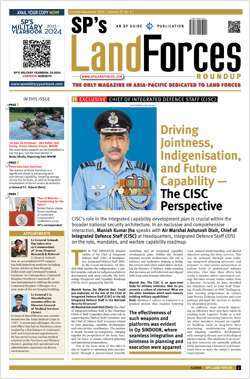INDIAN ARMED FORCES CHIEFS ON OUR RELENTLESS AND FOCUSED PUBLISHING EFFORTS

The insightful articles, inspiring narrations and analytical perspectives presented by the Editorial Team, establish an alluring connect with the reader. My compliments and best wishes to SP Guide Publications.

"Over the past 60 years, the growth of SP Guide Publications has mirrored the rising stature of Indian Navy. Its well-researched and informative magazines on Defence and Aerospace sector have served to shape an educated opinion of our military personnel, policy makers and the public alike. I wish SP's Publication team continued success, fair winds and following seas in all future endeavour!"

Since, its inception in 1964, SP Guide Publications has consistently demonstrated commitment to high-quality journalism in the aerospace and defence sectors, earning a well-deserved reputation as Asia's largest media house in this domain. I wish SP Guide Publications continued success in its pursuit of excellence.
- Appointments Committee of Cabinet approves one-month extension in service of Chief of the Army Staff
- Prime Minister witnesses 'Bharat Shakti' – a Tri-Services Firing and Manoeuvre Exercise in Pokhran, Rajasthan
- Interim Defence Budget 2024-25 — An Analysis
- Union Defence budget 2024
- Indian Army: In quest of greater firepower and policy recommendations for gaps
- Indian Army Annual Press Conference 2024
- Tata Boeing Aerospace Delivers 250 AH-64 Apache Fuselages, Manufactured in India
Remov AFSPA — periodic punchline
 |
By Lt. General P.C. Katoch (Retd) Former Director General of Information Systems, Indian Army |
There are frequent calls in insurgency affected areas for removal or dilution of the Armed Forces Special Power Act. Such calls are periodic in J&K and Manipur. It is also a election issue in Manipur this year, particularly by the People's Resurgence and Justice Alliance (PRJA) floated by Chanu Sharmila who has been demanding repealing of AFSPA for past 16 years. Consider the current volatility in the Kashmir Valley, the flurry of delegations, blatant obduracy of Hurriyat separatists despite pockets bulging with funds from both sides of the LoC, the write ups, debates on national TV, and besides the calls for autonomy, the rooting for removal of the AFSPA particularly by J&K politicians and national opposition MPs. Ironically, intelligence pundits kept dismissing Hurriyat separatists as "irrelevant" giving them free-hand in spilling anti-India venom and radicalizing the youth. Yet crores of exchequer money continues to be lavished on them. The ethnic cleansing of Kashmiri Pundits from the Valley was no less than the holocaust, And now, you find Farooq Abdulla rooting for azadi which is contrary to even the Constitution of J&K, leave aside the Constitution of India. Look at the opposition against removing Article 270, yet some 4000 Rohinya Muslims from Myanmar have colonized in Jammu area. Even the current Chief Minister of J&K, when in opposition was leading demonstrations for downing AFSPA.
One wonders if those calling for removal of AFSPA have ever gone into why, how and by whom was AFSPA introduced. Sure AFSPA provides extraordinary powers of force to soldiers deployed in disturbed areas, which has long been a bone of contention between human rights activists and those favouring adequate state response to terror and insurgency. Ironically, every time there are protests for removal of AFSPA, the finger is pointed at the Army, the Army is asked why they need AFSPA, Army veterans are summoned for TV debates, there are shouts to 'tone' down AFSPA and the like. The fact is that neither the Army called for AFSPA nor drafted this Act. It was debated by Parliaments and passed to ensure that the Army can function effectively in the designated disturbed area, when deployed. Deployment of Army in the hinterland and application of AFSPA comes only 'after' the said area is declared disturbed under the 'Disturbed Area Act'. An area is declared 'disturbed' when the state machinery is unable to function and calls in the Army for support. Therefore, any dilution of AFSPA then would mean diluted effectiveness of the Army in counter insurgency or counter terrorism and personnel getting involved in litigation consistently. A Disturbed Area Act passed on September 11, 1958 was applied to the seven northeast states. A similar act passed in 1983 was applied to Punjab and Chandigarh, which was withdrawn in 1997. A similar act was applied to J&K in 1990 and has been in force since. Neither does the Army ask for deployment in the hinterland, nor does it enjoy being forced to act against its own brethren when deployed in disturbed areas — its primary task being against the enemy and defending the borders. As importantly in an insurgency environment, the Army can only keep violence levels at manageable levels whereas the balance must be taken on by the state administration; the problems being of politico-socio-economic nature. The failure of the state to provide adequate governance has been the bane of continuing insurgencies. This has been the major reason why the Kashmir Valley remains volatile aside from Pakistani support to terror, politico-terror links, lack of worthwhile de-radicalization program and terror having become an industry by itself. Mehbooba Mufti protested against pellet guns introduced during Omar Abdullah's reign, today she thinks differently. Both Mehbooba Mufti and the next chief minister of Manipur are welcome to take up for removal of the Disturbed Area Act from their respective states. Should that happen, Army will automatically withdraw from the hinterland and there would be no need for AFSPA. But you cannot continue with Disturbed Area Act and simultaneously remove or dilute AFSPA which would amount to tying the hands of the Army behind their backs — implying the state administration merrily continuing to take refuge behind the Army. But the question is has the administration in these states created the environment for withdrawing the Disturbed Area Act? Simply removing the Disturbed Area Act without creating conditions for it would be disastrous.





